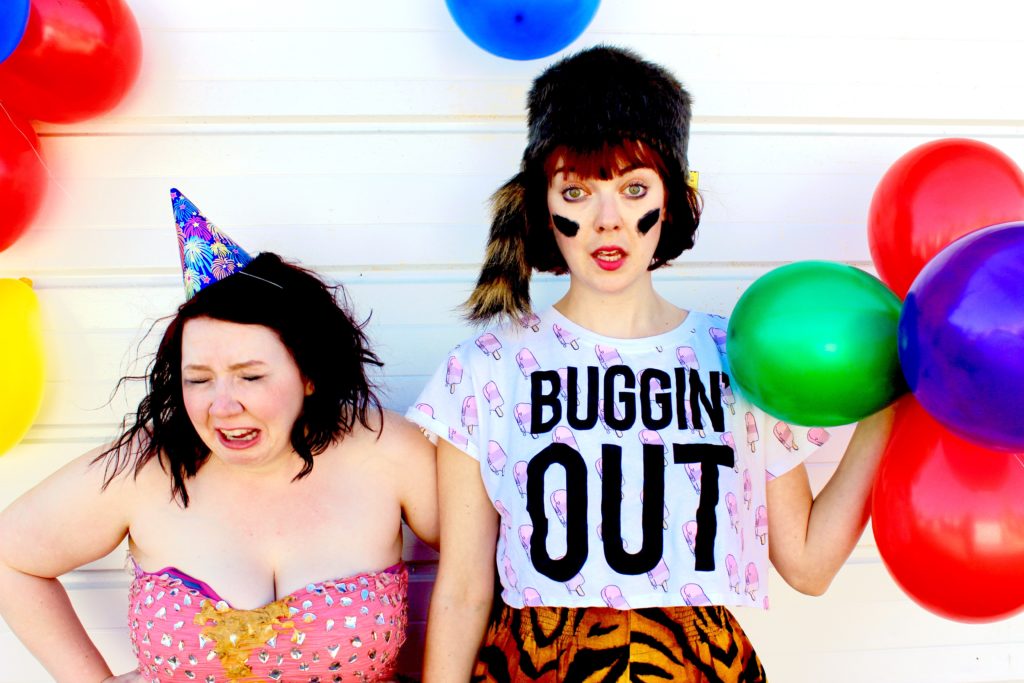
When Cheyenne Mabberley and Katey Hoffman debuted “The After Party” at the 2016 Fringe Festival, no one was prepared for the theatrical phenomenon the show would become. It won the Pick of the Fringe, Cultchivating the Fringe Award as well as The Georgia Straight Critics’ Choice Award. The industrious and extremely funny, young ladies are back to give us another cause for celebration at the Cultch with “The After After Party” where Jules and Fiona’s high school partying adventures become bolder and more badass. We sat down with Cheyenne Mabberley to learn all about the characters that have taken the Vancouver theatre scene by storm.
You and Katey are both Studio 58 alum. What was your journey into theatre like?
I was in plays since elementary school and in high school, my drama teacher told me “Studio 58 is the best school but don’t expect to get in right away!” He warned that they only take older students, which is usually true. He told me to audition anyway and to see what happens. I ended up getting in when I was 18. I trained there for three years. I met Katey there who was in the term above me. She took some time off and then rejoined into my term and we really hit it off. We started writing together and acting together.
How would you describe your friendship?
At theatre school we just grew together. It’s easy to get attached to people in theatre school because you’re around each other 24/7. I was at school more than I was at home. We both have a very similar sense of humour. Katey is my best friend. She’s a warm and beautiful person. I don’t know how to describe our friendship. I love her so much!
Did you bond over your love for theatre, creating and being artists?
Oh for sure. That’s what brought us the closest I think, writing “The After Party”. We fell so in love with the characters and fell in love with each other in turn. We got to be so goofy and vulnerable, and say weird shit. We got each other’s jokes. It all really brought us together.
Is it tricky to work with your best friend?
I think it was the other way round because we became best friends after we started working together. We’ve been writing these characters for five years now and I find it easier to write them together than by myself.
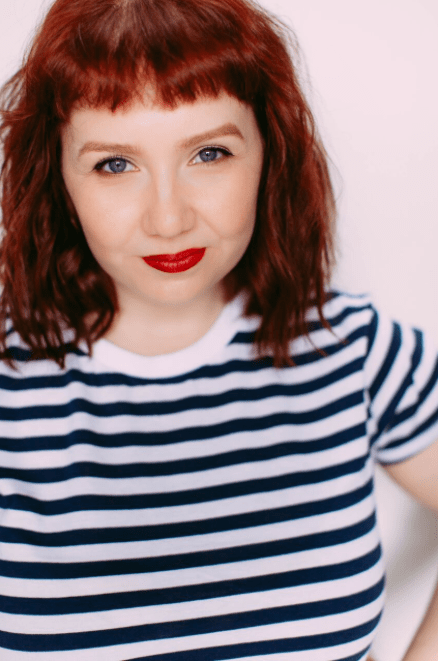
What was the inspiration behind “After After Party”? How much of the characters are you and Katey?
The first incarnations of these characters surfaced for us in theatre school for a 10-minute play festival called the Pull Festival. Our entry was based on our own experiences. It was about two drunk girls at a party. It was basically an exaggeration of our personal teen experiences.
We made clowns of ourselves because we’re both dorky and embarrassing. We wanted to show that to the extreme. I’d say that Jules and Fiona are at their core Katey and Cheyenne but just larger than life.
Jules is so much of who I was in high school. She is desperate and her priorities are super messed up. She wants to be the life of the party and she has this idea in her head about who she wants to be and it gets her into trouble. She is exactly who I was in high school, I just did way less drugs than she does.
The show tackles themes of female friendship, youth culture, and feminism. Would you say that classification is accurate?
I would say that is accurate. The show is feminist in that we’re two women on stage that are not following the tropes of women we saw growing up. We’re not being attractive. We’re breaking the mould of how women are seen on stage. It’s rare to have women on stage, and even more rare, female comedians.
It’s really hard to be a female comedian and so the show is feminist because there are two funny women on stage being themselves.
How important do you think partying and “going out” are in our personal development, especially as millennial women?
Most of our interactions as teens happen in school so with parties you get to play outside of that realm. There’s a lot of pressure surrounding parties in high school. Some of the biggest fuck-ups I ever had happened at high school house parties. As did some of the biggest lessons I learned, and friendships I formed. Parties were the anchor points in my high school life.
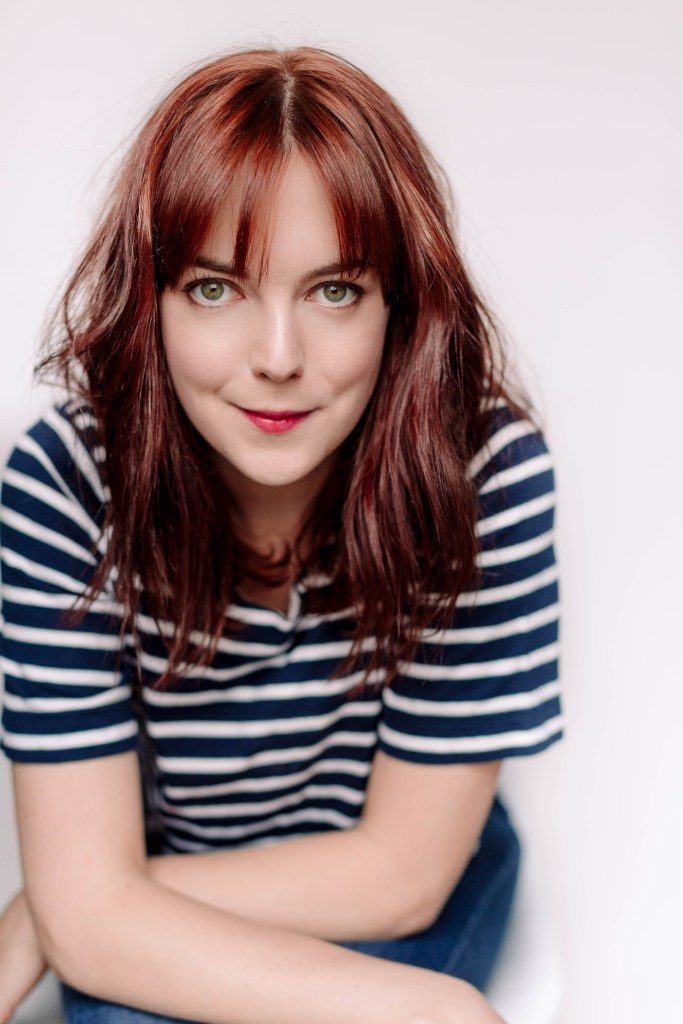
Is there a party that stands out?
I will never forget there was a party where I was convinced I would get back with my ex-boyfriend, and at that party I found out he was gay. It was the most heart-wrenching moment of my teen life. I was super high on pot brownies. It was a whirlwind of emotions. I was dressed up in a sparkly fucking gown and everyone was in jeans. And then through the grapevine I found out that my ex’s boyfriend was at the party. It was devastating. It was my birthday too!
That was a pivotal moment. The chaos of the night, the expectations in my head, the booze and the drugs. It was awful and I will never forget it.
When you’re young everything is turned up and amplified.
Yes, and you’ll see that with the girls as well. Everything is at like 11 and extreme. The stakes are so high. I remember feeling like that. Every social opportunity I had was make it or break it, a life or death situation. And 9 times out of 10 I remember failing and walking away being like “goddamit!”
If you had to go back and relive your teen years would you do it the same way?
Maybe. But I would do a lot of things differently. I would pay more attention to the reality of the situations versus what was in my head. With these characters, I get to relive those emotions every night and they feel so real to me.
Sometimes stories told by women about the female experiences are clumped as unimportant or shallow. Do you think by telling this story you are reaffirming that the stories of young women are worth telling and important?
Absolutely. I think there’s a lot of pressure right now for every woman on stage to be making some sort of political statement. We are expected to make stories bigger and about bigger issues, which is great too and needs to be done, but Katey and I just want to do what everybody else has been allowed to do.
Our stories are about us, they are not part of a political agenda. We want to be able to do what we want to do and make what we think is funny. And that happens to be inherently female. It’s really important for us to be honest and real.
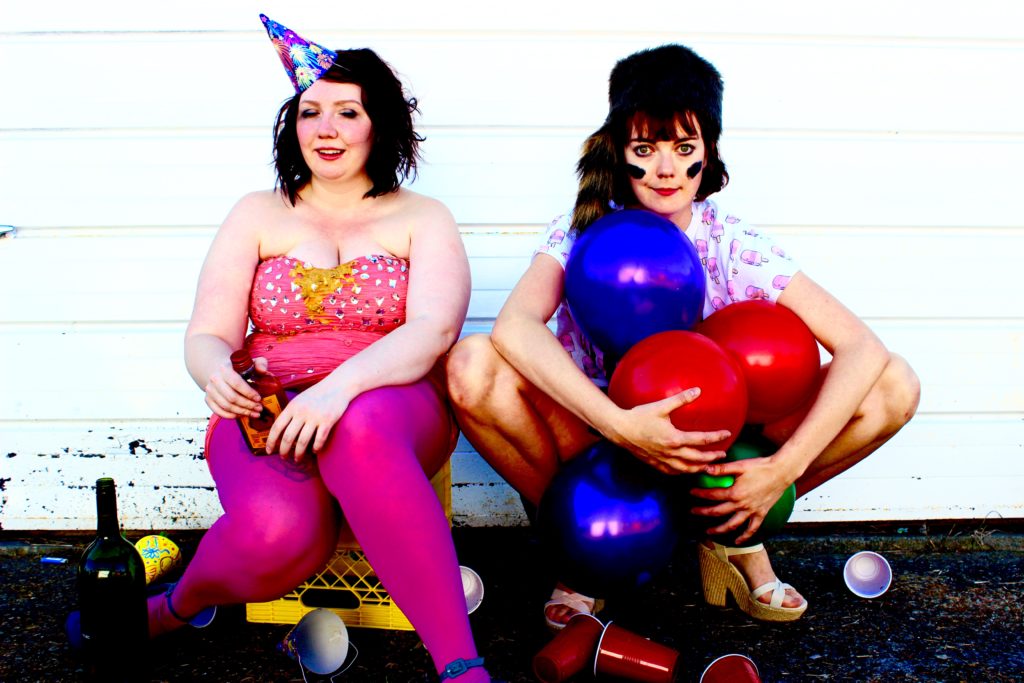
The show has got a great response, do you think it’s because we are thirsting for a female coming of age story, which isn’t as often represented as its male counterpart?
Coming of age stories about women usually revolve around dudes and love and romance and being beautiful. If you watch the show you’ll see we’re not anything like that. We’re pretty gross girls but that’s how I remember my high school years.
I mean the story is that Jules wants to go to the party because the guy she likes will be there but there’s a lot more to it than that. We never see the guy but we see that Jules’ belief that she can achieve popularity by being with this guy. I think the show is a fun exploration of that naiveté. Thinking that popularity and external validation will solve your problems.
The story is also about the societal pressures on girls. Fiona is a great foil for that because she’s a super oddball who doesn’t care for popularity.
The show has won numerous awards. Have you received any feedback about what resonated most with the audience? And were you surprised by any of it?
We definitely thought that the show is for women and that girls will relate to it the most but some of the most positive reviews we’ve had have come from older men. I think it’s because Jules and Fiona speak to the freaks and geeks of this world rather than just young girls. We didn’t expect older theatre-goers to appreciate it because we were being idiots, snorting Ritalin and drinking fireball.
Going into the show we decided that if we weren’t successful with it we’d give it all up but thankfully we received some good feedback and it kept us going. It’s the first time we’ve ever been popular!
Do you think we have good services and resources for young playwrights and actors in Vancouver? Any resources that you might recommend to young artists who might be struggling?
I think there is not enough money for sure in the arts. What is promising though is that a lot of the younger and smaller theatre companies in town are doing incredible work with younger artists. There are a lot of early career development grants that are supportive of artists.
There is still a lot of work to be done and its up to the big companies to step up and support younger theatre creators as well as to nurture younger audiences. There is a whole range of experiences and voices that is not being explored on stage right now.
It can also be a bit exclusive in town. A lot of the big companies hire the same people over and over again and they’re not doing themselves a favour. It’s just like high school!
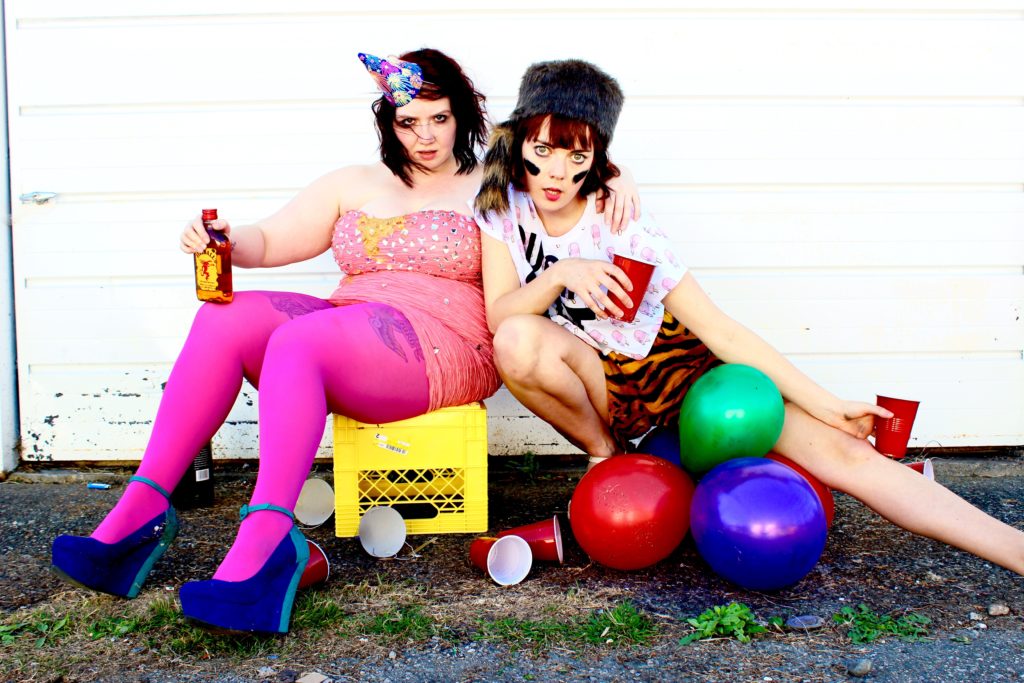
What stories do you find you’re interested in telling?
As writers, I feel we can only write about what we know essentially and what I know is the younger female experience. I set out to write a drama and it turned into a comedy. I can’t help myself! I love making people laugh and finding humour in the dark and bringing female voices to the front.
What is your writing and acting process like?
We’ve written different incarnations of these characters for different shows now. Most of the jokes come from the rehearsal hall. There is a lot of experimenting.
When Katey and I write it’s a lot of wine and making each other laugh out loud.
Who inspires you?
“Broad City” is really great. Those girls are so funny. I can see how their relationship and writing style is so similar to mine and Katey’s. You can tell they’re doing it to make each other laugh. The first season of “Girls”, (I stopped watching “Girls” halfway through), was the first time I saw women be unattractive in terms of their personalities and life choices. I found that very special. It was a big inspiration. Tina Fey and Amy Poehler have been doing it for years. They are so brave and so unafraid to be weird.
Is it hard to do comedy? Do you think you have a knack for it or do you have to really work at it and craft your jokes?
It’s easier now than before but the first drafts I’m sure were not that funny. It’s experience and doing the show and seeing what lands and what doesn’t. Writing with another person also helps. Katey is my buffer for finding out what’s funny. If it cracks her up then I know it’s good.
How does it feel to be a female artist in our current political climate? And how does the spotlight on the female experience affect your craft?
I think it’s great that our voices are being heard and that people are taking us seriously. We’re not there yet but a lot of work still needs to be done. But expecting us to make a statement with everything we do is not the best. There is, of course, need for work that deals with equity and oppression, but at the same time, we need equal opportunity to tell our stories whatever they might be.
Do you think theatre companies are feeling the pressure to tell women’s stories?
I don’t want to think it’s because of pressure but because we are making great work. The Cultch is run by amazingly strong women and that’s why we got an opportunity there.
I think what’s happening is that people are hearing women’s stories and realising that they’re good and funny.
What’s on the horizon for you and Katey after this run?
We are working on a program with Pi Theatre for an improv show called “Lady Parts”. We had two shows this fall, “Boobs” and “Brains,” and coming up we have “Heart” and “Vagina.” Every night we have two guest actors and a guest director to come on with us, and Katey and I write sketches. We had Nasty Women Improv and Rachel Lark singer-songwriter. It’s a celebration of all things female.
We’re going to look for funny female plays to produce at our company “The After Part Theatre Society” and we’re going to keep writing!
“The After After Party” plays at the Cultch from March 6th to the 13th. You can get tickets at tickets.thecultch.com! Keep an eye out for Lady Parts tickets here and Nasty Women Improv over here.
– Prachi Kamble
